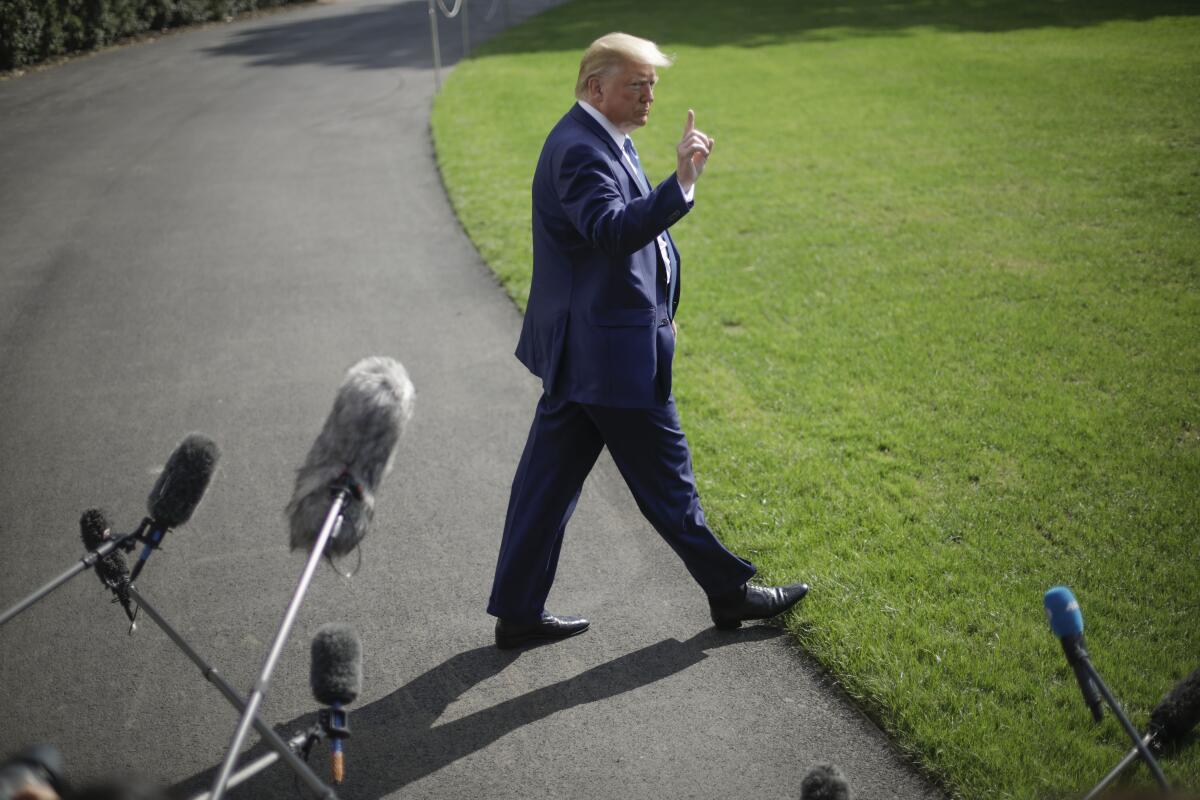Column: Trump should read the Constitution

- Share via
WASHINGTON — There are times in Washington when events shift into fast forward. The last two weeks have felt faster than that.
To recap the most head-snapping events: After initially denying that he had urged Ukraine to dig up dirt on Joe Biden, President Trump boasted that he had done just that — and publicly asked China to investigate Biden too.
Then, after Trump denied that his demand to Ukraine was linked to his decision to withhold U.S. military aid, text messages between U.S. diplomats and an account from a Republican senator confirmed that it was.
As the evidence mounted, the president accused House Democrats of plotting a “coup” and suggested that a senior member of Congress should be arrested for treason.
On Friday, House Democrats issued a subpoena to the White House for documents about Trump’s dealings with Ukraine and his aides’ alleged attempts to cover them up. That kicked the impeachment inquiry into overdrive and probably means a ferocious court battle ahead.
One thread ties these collisions together: This president doesn’t appear to know or care much about the Constitution, especially the limits it puts on his power.
“I have an Article II, where I have the right to do whatever I want,” he said last year, referring to the part of the founding document that establishes the executive branch. But that’s not what Article II does at all.
Article II is the president’s job description. Like any job description, it spells out what he should do — and, by implication, what he shouldn’t.
It says that the president is commander in chief of the armed forces; that he has the power to appoint officials once Congress authorizes their positions; and, most important, that “he shall take care that the laws are faithfully executed.”
It doesn’t give him the authority to ask foreign governments to investigate a potential opponent in the next election or block U.S. military aid to an ally to help his reelection campaign.
After trying out several explanations for his actions, Trump belatedly tried to cloak them in virtue by saying they were part of a hitherto undetected campaign against global corruption.
“I have an absolute right, perhaps even a duty” to investigate corruption, he tweeted, including asking “other countries to help us out.”
But no president’s rights are absolute. And if Trump had read the Founding Fathers, he would know they saw foreign governments meddling in American politics as a threat, not an opportunity.
“As often as elections happen, the danger of foreign influence recurs,” warned John Adams, who would become vice president under George Washington.
“This is basic stuff,” another future vice president said. “Foreign donors, and certainly foreign governments, cannot participate in the American political process.” That was Mike Pence in 2016.
Article II limits the president’s powers at home too. It doesn’t enable the president to order Congress to do his bidding, a feature that seems to have surprised Trump. “I find Congress more difficult, frankly, than many of the foreign leaders … because they have their own views,” he said in June.
He treats the judicial branch of government the same way. In Trump’s view, judges who rule in his favor are good; judges who rule against him are bad, or Democrats, or (in one case) “a Mexican.” His lawyers have argued that Article II protects a president from being investigated for any crime whatever, a superpower none of his predecessors claimed.
But the real tip-off to Trump’s autocratic view of the presidency is the way he describes his political opponents as enemies of the state.
He calls Rep. Adam B. Schiff (D-Burbank), chairman of the House Intelligence Committee, guilty of “treason” for paraphrasing Trump’s conversation with the president of Ukraine in a disrespectful way. “He was lying about the president of the United States,” Trump complained.
In monarchies and dictatorships, “treason” often covers discourtesy to the head of state. In Thailand, a man was jailed in 2015 for mocking the king’s dog. North Korea’s ruler, Kim Jong Un, ordered an aide killed for dozing off during his speech.
But in the United States, even lying about the president is not treason, which is carefully defined in (you guessed it) the Constitution as: “levying war against [the United States, or] adhering to their enemies.”
The Constitution protects Schiff’s freedom not once but twice: in the 1st Amendment, which guarantees freedom of speech, and in the speech or debate clause of Article I, which protects members of Congress.
Impeachment is in the Constitution too, in Trump’s favorite part, Article II. It’s a legitimate exercise of Congress’ power, even if he doesn’t like it — not an extraconstitutional coup d’etat, as he claims.
As for whistleblowers, they’re not in the Constitution, but they’re protected by laws that are even older.
In 1778, during the Revolutionary War, the Continental Congress declared it a “duty” of U.S. officials “to give the earliest information to Congress or any other proper authority of any misconduct, frauds or misdemeanors.” The law was passed after Rhode Island jailed two Navy officers for blowing the whistle on a superior.
Trump took an oath to defend the Constitution. Instead, he’s attacking it — by inflating and abusing his powers, ignoring laws he swore to protect and demanding unconstitutional reprisals against anyone who opposes him.
No matter what the president imagines Article II to contain, he doesn’t have the right, “absolute” or otherwise, to distort U.S. national security policy to damage a political rival or stonewall legitimate inquiries from Congress. He needs to take an hour of executive time and read the Constitution.
More to Read
Get the L.A. Times Politics newsletter
Deeply reported insights into legislation, politics and policy from Sacramento, Washington and beyond. In your inbox three times per week.
You may occasionally receive promotional content from the Los Angeles Times.











